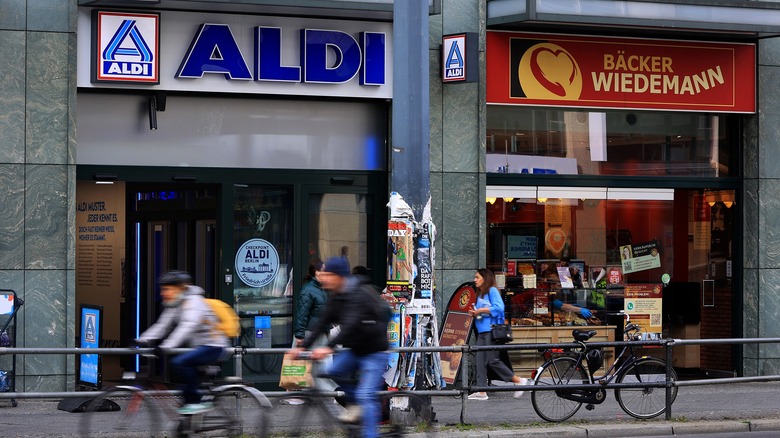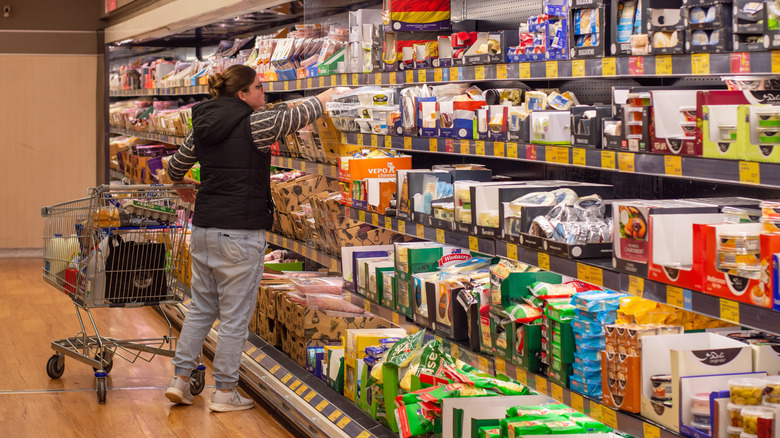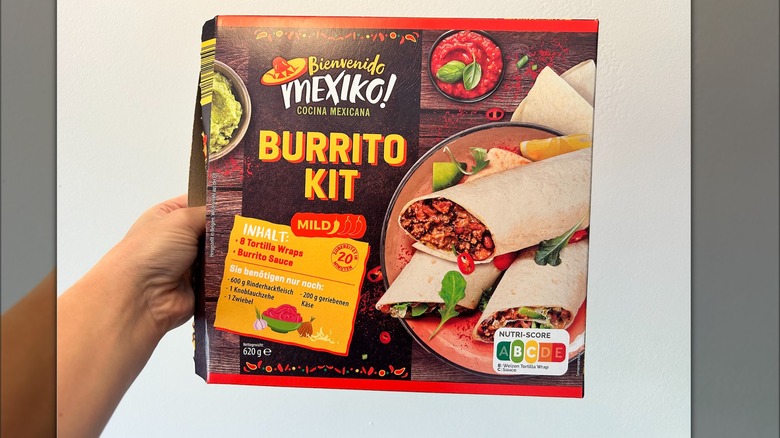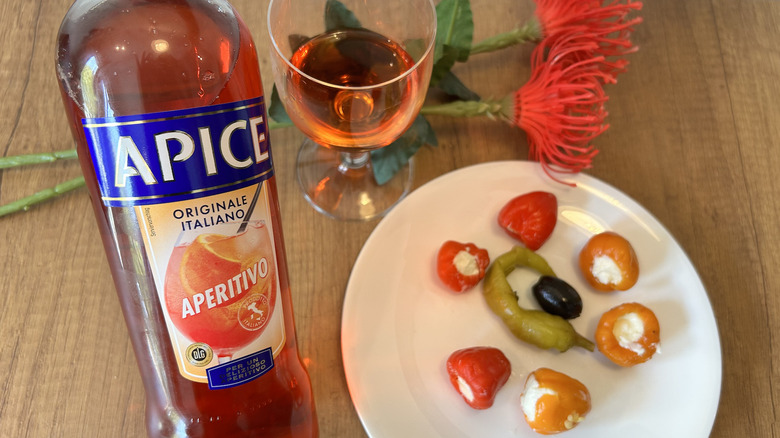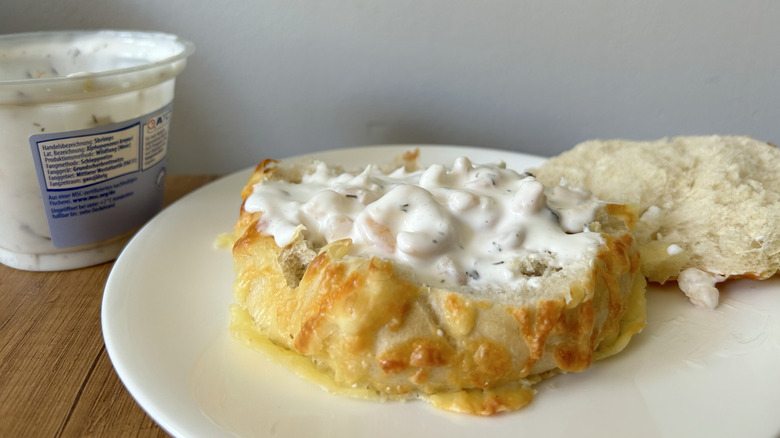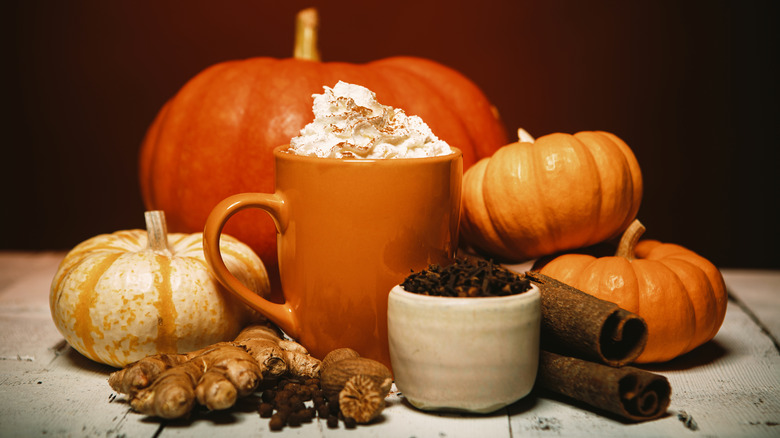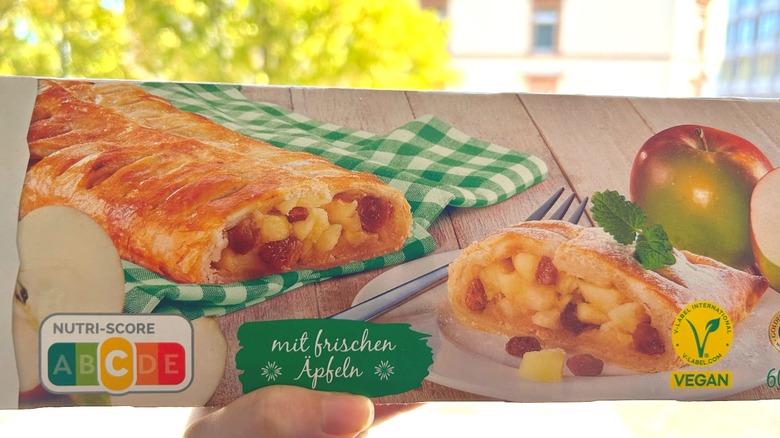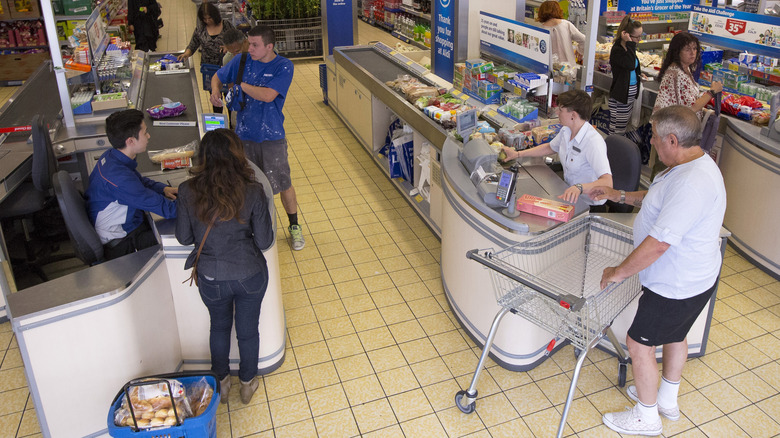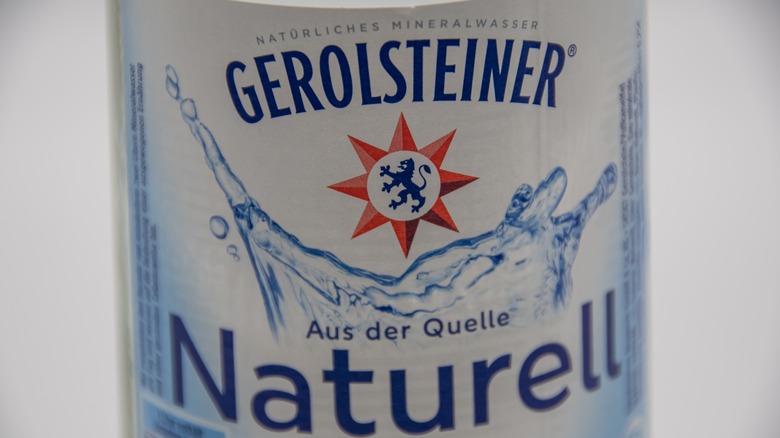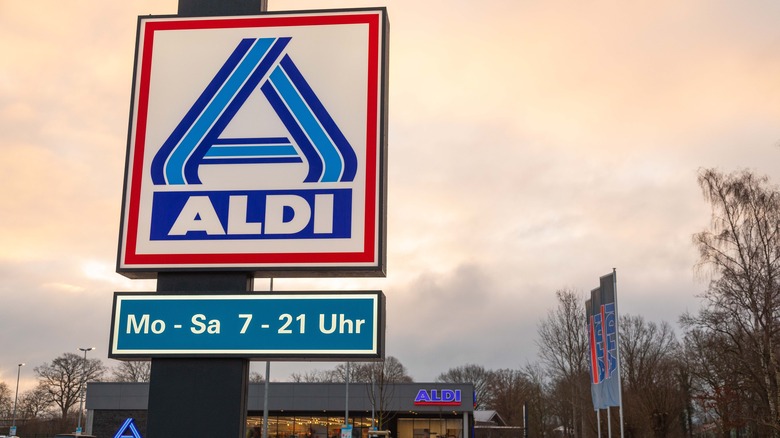We Went To A German Aldi And These Were The Things That Surprised Us
The first time I ever went to an Aldi, I was on my honeymoon in Figueira da Foz, Portugal. Like many newlyweds, my husband I and were trying to have as much fun as possible... while keeping our spending to a minimum. So, we asked the receptionist at our hotel where we could get some cheap eats ("No, we mean really cheap"), and he pointed us on our happy way. Fifteen minutes later, I found myself in a warehouse crammed with glimmering products — including a 2-pound box of cold spinach spaghetti salad, which I carried back to my hotel room like a trophy and nibbled on for days. (If you'd like to make your own, try this penne pasta version).
When I eventually headed back to the United States, I was pleased to find that Aldi was becoming a phenomenon in my home country, as well. And, while I never found that same spaghetti salad again, I did fall in love with some of the supermarket's best products. I'm talking about the take-and-bake pizzas, the salad kits, and, yes, the warm fluffy goodness of Aldi's German-style pretzels.
So, when I finally found myself in Germany — a.k.a, Home of My Favorite Supermarket — I could not wait to stick a quarter (euro?) into my shopping cart and give that baby a whirl. Full of hope and, admittedly, expectations, I waltzed into the O.G. Aldi chain... and quickly realized that I was in a whole new world.
Don't expect to see as many ready-to-eat foods
The first thing that surprised me when I walked into the Aldi in Heidelberg, Germany, was that it did not seem to have a lot of ready-made fare. When I was on my honeymoon in Portugal, Aldi's giant box of pre-made spaghetti basically saved me. Our hotel room was not equipped with anything more elaborate than your typical under-the-desk refrigerator, and, boy did we stuff that ice box with wraps and salads galore. Later, when I discovered Aldi's U.S. locations, it didn't take long for me to stock up on prepared deli salads, microwavable mac-n-cheese, and, occasionally even the oh-so-controversial frozen sushi.
With these past experiences in mind, the first thing I did when I strutted into the German Aldi was scan the aisles for something that I could easily take and eat. My gaze quickly landed on a small cooler located near the check-out counters. And, I was pleased to see a couple of prepared salads, a box of sushi shaped like a heart, and a few tuna-stuffed nigiri triangles.
I sauntered on to the next cooler wondering what kinds of goodies I was going to find. Sauerkraut salads? Bratwurst rolls smothered in mustard? Some kind of German-themed charcuterie board? But instead... I just found your typical rows of milk, yogurt, and fish. Out of denial, I did another lap, searching for the ready-made eats of my dreams. Alas, it was just not to be.
Say goodbye to your favorite Mexican foods
As soon as I realized just how few ready-to-eat options there were at German Aldi, I began to assimilate the fact that I was, well, not in Kansas anymore. Curious yet cautious, I worked my way through the supermarket aisles — which were crammed with boxes overflowing with unfamiliar products. I poked around looking for international eats and found jars of Tikka Masala and boxes of dried couscous.
The American in me couldn't help but search for the Mexican items that I can buy at the Aldi in my hometown. Chunky salsa and hot jalapeño preserves were pretty high on my list, but as I scanned the market, it was clear that those things weren't an option. Corn masa mix and queso fresco were also nowhere to be found. The closest thing that I could find was a boxed burrito kit similar to the fajita boxes at U.S. stores. It contained eight tortillas and two large pockets of something called "burrito sauce" (salsa, perhaps?). I took a box home.
Assembly was easy. I just had to mix the sauce with my ground meat and veggies and wrap it all in a flour tortilla. The sauce was thick and gooey. It tasted like marinara sauce that had been blended with pinto beans and lightly seasoned with paprika. It was not necessarily my favorite, but, of course, no packaged fare can compete with fresh homemade salsa.
Get ready for some amazing aperativos
At first, I might have been a little off-put about the fact that the Aldi in Germany was not exactly what I had imagined it to be. Okay, to be honest, I was super off-put by the first few minutes of my shopping experience. But, as I let go of my previous expectations, I opened myself to the possibility of stumbling on a new gem. And, by "gem," I mean the glimmering orange glass bottles that are Aldi's Apice spritzes.
To give you some background, I love Italian aperativo culture. I love gathering with friends and family before a big meal to indulge in a bitter beverage and some light snacks. And, I particularly love the fizzy texture of a good, old-fashioned spritz. So, imagine my surprise when I came across Aldi's Apice spritz six-pack! I practically threw the drinks into my grocery cart — and proceeded to experience even more excitement when I noticed that the market also offered tons of cold plates to go along with it. I selected cheese-filled South African peppers, stuffed grape leaves, and a very reasonably priced wheel of brie.
Back at my apartment, I enjoyed a spread that I believe was worthy of Rome's finest. The Apice spritzes were bitter and tangy with a strong orange flavor and undertones of rhubarb — perfect for a warm summer evening. They also paired nicely with the South African peppers, which were pickled and spicy all at once.
Be prepared for some next-level regional items
Italian aperativos were not the only hidden delicacies that I found on my German Aldi adventure. I also discovered some pretty amazing regional specialties piled up in the frozen section. Of course, the famous pretzels were there, as well as the ever-coveted pigs' knuckles. But, there were a few new things that I spotted that were less familiar.
Soon, I found myself choosing between going home with a seed-covered roll stuffed with some sort of jam, or an unusually flat sandwich. I studied both boxes carefully and determined that the first pastry must have been blueberry flavored, while the sandwich appeared to have a Camembert and cranberry stuffing. Ever the self-proclaimed, cheese-eating champion, I went for the second option.
When I returned back to my apartment, I heated up a skillet and dutifully cooked my German sandwich. As soon as it cooled down, I sliced it in halves and took a tentative bite. What I ate next was a thin layer of melted Camembert topped with cranberry jam and crammed between two, thick pieces of toasted hash browns. The outer potato crusts were savory and perfectly seasoned, and they provided the ideal contrast to the sweet yet slightly acidic cranberry component. Meanwhile, the cheese was strong, just as Camembert should be. My only complaint was there was not enough of it.
Expect a huge variety of deli salads
In the United States, Aldi's potato salads have kind of a bad rap. Even though they are sufficiently creamy and offer that nice, soft spuddy texture,these prepared salads have earned a reputation for being too sweet. And, not everyone is a huge fan of extra sugary side dishes.
Because of this, when I finally got to the Aldi in Germany, I was a bit hesitant to start throwing boxes of any pre-made deli salad into my grocery cart. However, as I worked my way through the refrigerated goods section, I could not help but notice that there was a wide variety of mayo-based mixtures sitting on the shelves. To begin with, there were two kinds of potato salad — one with eggs and mayo, in addition to a vegan version. There was also chicken salad, shrimp salad, tuna salad, herring salad, egg salad, and something called a "Budapest salad," which was ostensibly a mayo-based dish involving beans, red peppers, and onions.
I figured that Aldi could not possibly offer so many different types of salads unless they were popular, so I took the plunge and went home with a box of shrimp salad. And, boy, was it good. When I opened the container, I was pleased to see just how many rock shrimp were crammed into that salad. Once I tasted it, I was thrilled with the creamy texture, mild seafood flavor, and hint of dill.
Get excited about more French wines
Of course, as I was shopping for my dinnertime eats, I had to find a nice bottle of wine or two to go along with them. So, I worked my way to the back of the store, where a giant sign reading "Wein" loomed over the shelves. As I examined the options, I wasn't too surprised to see a fair number of German Rieslings (I was in Deutschland, after all) but I couldn't help but be pleasantly surprised to notice a solid selection of French wines too.
There were a few Bordeaux wines, a couple of options from the Cotes du Rhone, and even a Cheateauneuf-du-pape. At first, I wasn't sure which bottle to reach for, as I love each of these regions more than the last. But as I considered my choices, I realized that it was too hot out to drink anything with too much body. In the end, I went for the 2022 Coteaux D'Aix-en-Provence, a rosé that carried the official, French denomination of origin stamp. And, let's just say that I was not disappointed.
This wine was light and dry without being too acidic. As far as flavor goes, it contained mild berry notes that swirled around with the slightest floral undertones. It is the perfect thing to pair with something equally mild, like queso fresco or a nice cucumber and tomato salad. For less than five euros, this "wein" was a great deal.
Don't expect to see your favorite fall-themed foods
Unfortunately, though, for all the things that I enjoyed about the Aldi in Germany, there were a couple of American items that I missed desperately — namely your basic fall fare. And, let's be real, one of my favorite parts of autumn is waltzing into my favorite supermarket and being immediately immersed in a world of pumpkin-flavored breads and cookies that smell like baked apples.
This year, Aldi's U.S. locations are offering pumpkin spice products that range from whipped cream to pretzels to butter to almond milk coffee creamers. However, in Germany, I noticed that the fall flavors explosion was, simply, not ... exploding. As much as I scoured the store, there really was not a single pumpkin spice anything in sight.
Luckily, though, the lack of fall-themed fare didn't mean that the German Aldi didn't have any traditional autumn eats. I did find some apple strudel in the frozen goods section — which was good enough for me. I bagged it, brought it home, and was immediately glad I did. While I am just as suspicious of prepared pastry dough as the next person, I was relieved to find that my strudel was light and flaky. The filling also contained raisins, which provided some nice contrast to the slightly tart apples. My fall-fueled cravings were fulfilled.
Your food will come with a grade
Another thing that really surprised me while shopping at the Aldi in Heidelberg was that each product came with a "Nutriscore," which was basically a grade somewhere between A and E. My Camembert and cranberry sandwich, for example, came in as a solid C, while the burrito kit earned a B/C rating. This meant that the German government considers these items middle-of-the-road in terms of health benefits. In other words, they won't earn the A grade of a salad kit, but, boy do they score better than potato chips or beer. My apple strudel, for the record, also earned a C, which as far as I am concerned, is a passing grade.
Interestingly, the Nutriscore system is the German government's way of helping consumers understand the grocery store items that offer a lot of nutritional value and those that don't. That being said, food suppliers don't have to label their products, and many local companies have opted out of the system.
Aldi, meanwhile, has taken the opposite stance. Rather than hiding the nutritional value of its foods, the supermarket chain adopted the Nutriscore system on every single one of its German brands. As I was doing my shopping, I definitely felt that I had a better understanding of what I was buying and whether or not it was healthy, although, admittedly, the Nutriscore grades never impeded me from reaching for something yummy.
The checkout counter at the German Aldi is not for the faint of heart
When my cart was finally piled to the top with goodies, I headed to the checkout line and began placing my items on the conveyor belt. I already knew from past experiences that I had to bring my own bags to Aldi, so I had my canvas backpack ready to go. And, given the grocery store's unique reputation for extra-speedy checkouts, I made sure not to dawdle as I unpacked my cart.
But nothing — and I truly mean nothing – could have prepared me for what happened next. If checkouts at American Aldis are fast, checkouts at German Aldis are bordering on supersonic. The cashier whipped her way through my products so quickly that she was practically throwing them from the scanner to my general direction. Like a goalie trying and failing desperately to catch a flying soccer ball, I scrambled to collect the items fast enough that the people behind me in line wouldn't be bothered.
And, to be honest, I failed miserably. No longer was I on the highways of Aldi checkout counters — I was on the Autobahn. I did everything in my power to get my groceries off of the conveyor belt and back into my cart. As I endured the smoldering stares of the locals in line behind me (my sincerest apologies), I pushed my cart towards the tables in the back and bagged my food, completely stunned.
Water bottles come with an unexpected tax
In all the confusion of my chaotic checkout experience, I didn't have the chance to review just how much I was charged for each item. As I was going over my receipt when I arrived home, I was initially surprised. In fact, every single water bottle that I had purchased at the German Aldi came with a .25 euro surcharge. And, when I asked a neighbor about this issue, it was explained to me that, in Deutschland, this is normal.
Germany has something called the "Pfand" system. This initiative charges consumers anywhere between .08 and .25 euro above the market rate for every bottle that they consume. This means that if your typical sports-sized water bottle costs 1.00 euro, you might end up paying 1.25. But, interestingly, the schema doesn't end there. After you are finished with your bottles, you can actually take them back to the supermarket and get those .25 euros back.
So, three days later, I headed back to Aldi with a backpack full of water bottles. At the front of the store, there was a processing machine for recyclables, and I proceeded to place each of my plastics inside one by one. The machine spit out a voucher, which I was able to use to get a few bucks off of my next purchase.
German Aldi locations are closed on Sundays
All in all, my experience at a German Aldi was positive enough that I wanted to keep going back. I loved my aperitivos, savored my potato sandwich, and could not stop thinking about some of the other regional specialties that I noticed in the frozen section. So, when I woke up one lazy morning with an intense apple strudel craving, I grabbed my backpack and was on my merry way.
The first sign that something was wrong came in the form of an empty parking lot. Seriously, the place looked like a ghost town. But, in my ever-optimistic mind, I figured that everyone else in Heidelberg was having a way more relaxed morning than I was and that I was just the first person to get there. I even thought that the lack of movement meant I was going to have an easier time in the checkout line.
Oh boy was I wrong. As I soon discovered, the Aldi in Heidelberg closes on Sundays. And a bit more research found that this is also true for other store locations in the country — even the ones in big cities. This is a result of "Ladenschlussgesetz," or a German law that requires shops to close on Sundays or Christian holidays. So, if you're in Germany and need to make an Aldi run, just be sure to check your calendar first.
